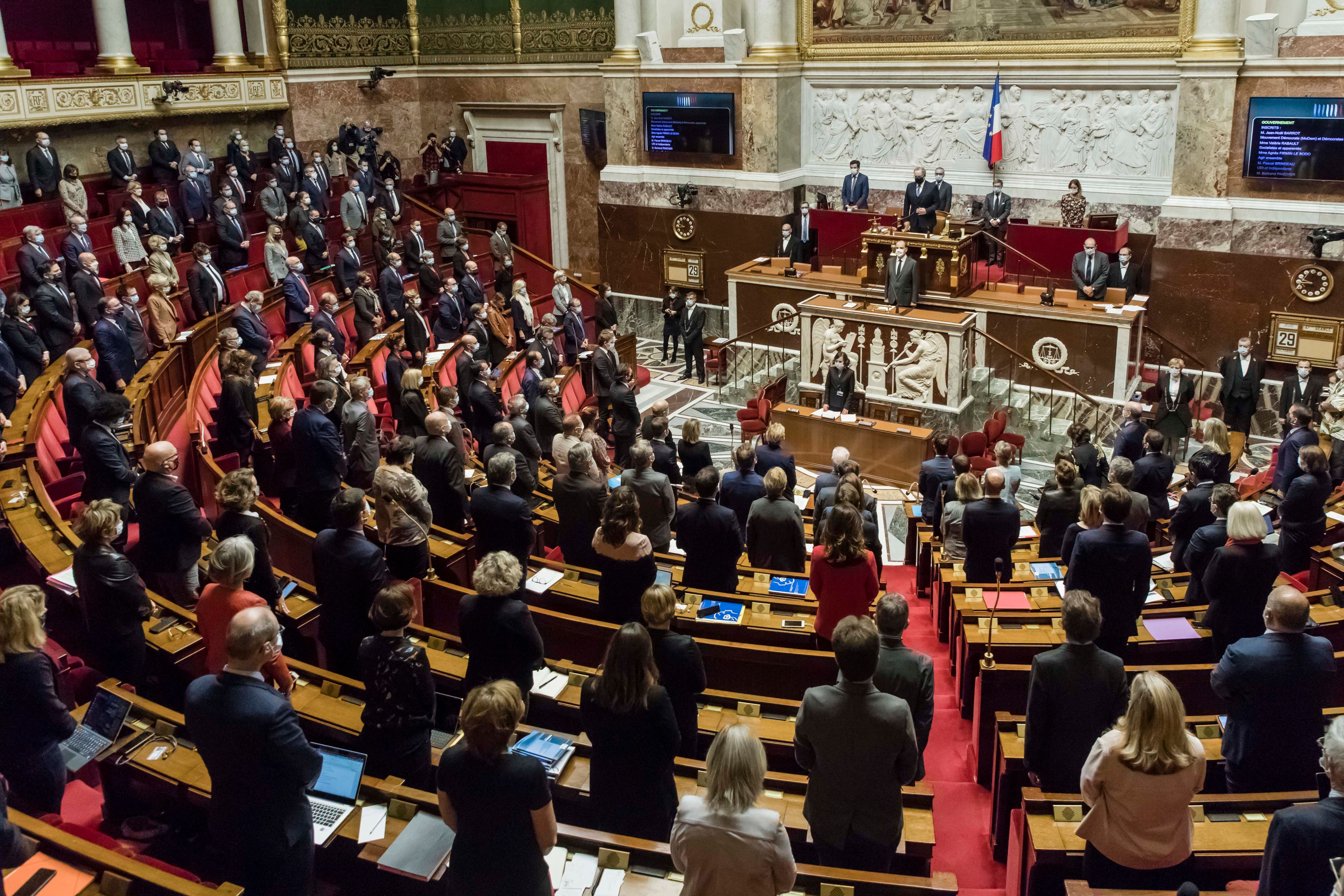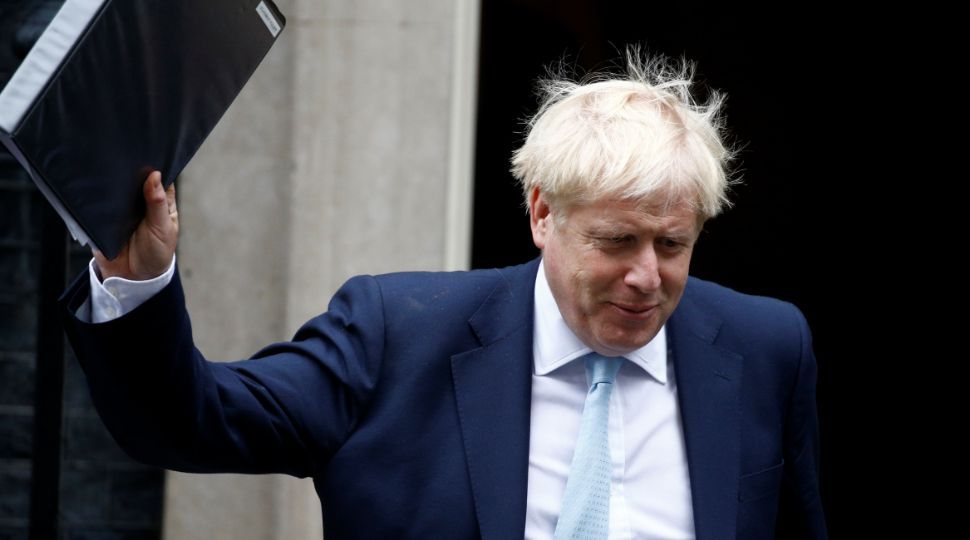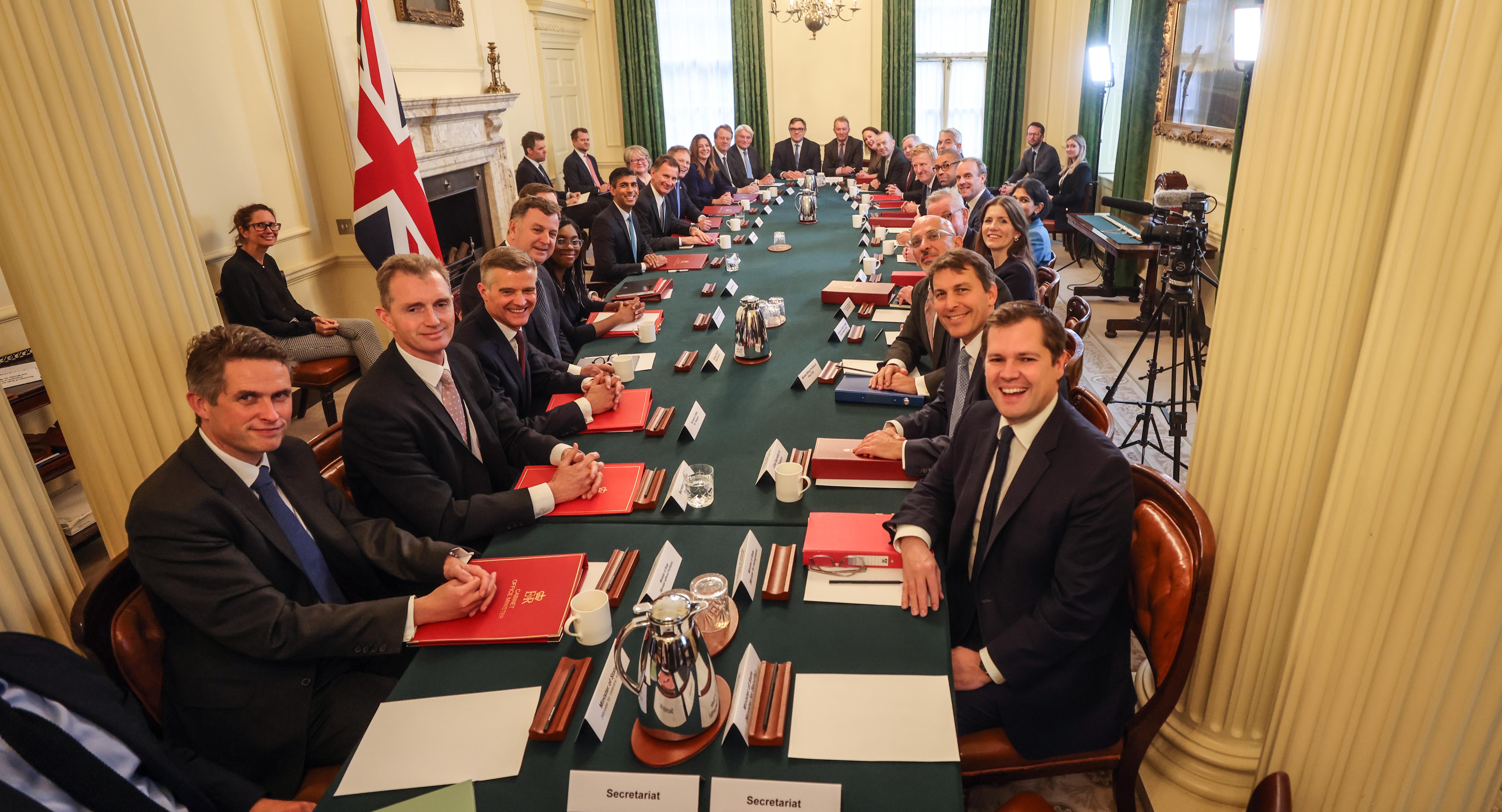Between Crisis and Cooperation: UK-France Relations after Brexit
Relations between the UK and France have remained tense since the announcement of the decision to hold the British referendum on EU membership in 2015. The conclusion of the EU-UK Trade and Cooperation Agreement of December 2020 did not improve them, but the consequences of Russia’s aggression against Ukraine have highlighted the need for cooperation between the two countries. Despite conciliatory gestures from both sides, relations have remained largely held hostage by internal policies. This is particularly evident in three areas: the regulation of the UK border on the island of Ireland, the issue of mass crossings of migrants across the English Channel to Britain, and the rules of participation of the UK in selected EU programmes. The first summit of the two countries since 2018, scheduled in Paris on 10 March, is intended to improve bilateral relations.
 POOL / Reuters / Forum
POOL / Reuters / Forum
Although the UK and France traditionally represented different approaches to European integration and, to some extent, to the economy (liberalism vs. interventionism), cooperation between them was an important factor in the balance and coordination of interests within the EU and NATO. Despite numerous differences, they had in common the strength and ties of their economies, their status as nuclear powers, their unique ability in Europe to project power beyond the region, as well as global interests connected to their overseas territories and post-colonial ties.
The most important factor in British-French relations in the last decade was the set of issues related to the UK’s relations with the EU. In 2013, Prime Minister David Cameron committed to renegotiating the terms of British membership of the European Union.[1] To increase his electoral chances and strengthen his negotiating position towards the EU, he announced that if he won the 2015 general election, he would hold a referendum on the UK’s EU membership. Although he obtained some concessions from the EU in renegotiations of membership rules in early 2016, after his election victory he failed to convince the British to stay in the Community. In the referendum held in June 2016, almost 52% of British citizens voted to leave it. As a result, it was necessary to develop completely new conditions for UK-EU cooperation. The complex negotiation process that started in 2017 consisted of several stages and led to the signing of two Brexit agreements. The first was the 2019 Withdrawal Agreement, which set out the terms of the UK’s exit from the EU. The Protocol on Ireland/Northern Ireland was attached to it, which was to prevent the establishment of a “hard” land border between Northern Ireland and the Republic of Ireland. This agreement enabled the formal withdrawal of the United Kingdom from the EU on 31 January 2020. The second one was the Trade and Cooperation Agreement (TCA), concluded in December 2020, which enables the functioning of the EU-UK free trade area.
The radical shift caused by Brexit has revealed significant differences of interest between France and the UK. The source of the problems is the similarity of the structures of their economies, provoking rivalry, for example in the areas of financial services, the aviation and armaments industries, and fisheries. Serious tensions arose over French fishermen’s access to British waters after the expiry in 2021 of their quotas under the Common Fisheries Policy.[2] Sharp disputes were also caused by the issue of migration control from France to Great Britain.
Until July 2022, a factor hindering the improvement of British-French relations was the dispute between President Emmanuel Macron and Prime Minister Boris Johnson. Although it was rooted in different visions of European and transatlantic cooperation, it also had an important personal dimension. The leaders engaged in actions humiliating for the other.[3] Also, the change of British prime minister to Liz Truss did not guarantee an improvement in relations.[4] Only the international and economic crisis caused by the Russian invasion of Ukraine, as well as the renewal of Macron’s mandate in May-June 2022 and the changes in the UK premiership a few months later, created the conditions for calmer bilateral relations.[5] The French authorities welcomed with hope British participation in the first European Political Community (EPC) summit, held in October 2022 in Prague. The subsequent governments of Truss and Rishi Sunak signalled their willingness to use the new format for cooperation in the field of foreign and security policy, omitted from the TCA.
British Interests
The UK’s main goals in its relations with the EU concern the reduction of immigration, the model of regulation of the UK-EU border on the island of Ireland, and the influence of EU courts on British legislation. After the decision to leave the EU, one of the main goals of the UK was to negotiate a deal that would provide access to the single market without having to respect many of the norms and rules set by the EU. From the British perspective, the EU took an uncompromising stance during the negotiations of the deal, with France in particular being blamed. This was influenced by, among others, the prominent role of French politicians in both national and EU institutions in shaping the EU position.[6] The political tensions surrounding the negotiations meant that France was increasingly portrayed in Britain not as a strategic ally but as a rival.
The UK supported the aim to prevent Brexit from leading to the re-creation of typical border infrastructure on the land border between Northern Ireland, which is part of the United Kingdom, and the Republic of Ireland, a member of the EU—the so-called “hard border”. In parallel, the UK wanted to ensure that the control of the flow of goods between the EU and Great Britain did not result in a de facto maritime border between Great Britain and Northern Ireland. During the negotiations on the Irish Protocol, France was perceived as pressuring the European Commission to adopt the most restrictive model of an intra-UK maritime regulatory border.
After Johnson took power from Theresa May in July 2019, the British government attempted to renegotiate the Withdrawal Agreement. Although Johnson’s actions increased tensions with France, the permanent emergency mechanism for managing the island of Ireland’s land border (called the “backstop”) was replaced with a temporary one, which the parties must extend or replace with a new one by 2024.[7] Johnson’s attitude also had a fundamental impact on the model of EU-UK relations finally adopted in the TCA of December 2020. He abandoned close economic relations with the EU (including participation in the common market for goods and a customs union with the EU) favoured by May,[8] in favour of a model that empowers British decision-making and sovereignty (and consequently excludes, among other things, extensive agreements harmonising British law with that of the EU).[9] In addition, the British side unilaterally closed TCA negotiations on cooperation with the EU in the field of foreign and security policy, arguing that the decision-making mechanisms proposed—on France’s initiative—by the Union were based on EU institutions and undermined British sovereignty after Brexit. The actual reason for the British decision to narrow the negotiations was also related to attempts to persuade the EU to offer the UK more favourable terms of economic cooperation in connection with the UK’s contribution to the security of the EU and its Member States (arguing the EU was free-riding).
Since 2020, a significant source of tension in British-French relations has been the model for implementing both Brexit agreements. The UK promoted an interpretation of the agreements that minimises the negative consequences of the introduction of controls at the maritime regulatory border between Great Britain and Northern Ireland as much as possible. It also tried to obtain the EU’s consent to reduce the role of the Court of Justice of the EU in the supervision of this agreement. The British side (especially the Northern Irish Unionists) argued that the maritime border model, as proposed by the EU, which is focused on protecting the integrity of its single market, is incompatible with other, equally important objectives indicated in the Ireland/Northern Ireland Protocol, especially with respect to the Good Friday Agreement, underpinning the Northern Ireland peace process.[10] A compromise solution to the UK-EU dispute would require the European Commission to receive a new negotiating mandate from EU Member States, a change which is opposed by, among others, France. To increase the pressure on France and the EU, the UK has been conducting a legislative procedure since June 2022 on a bill enabling unilateral repeal of the provisions of the Ireland/Northern Ireland Protocol in accordance with British demands.[11] However, the application of this law, if it were enacted, would be contrary to international law. The lack of an EU-UK agreement politically destabilises Northern Ireland (including the failure to re-constitute the NI Assembly after the election in May 2022 and the need to call a new one). Hence, the situation in Northern Ireland may result in outbreaks of violence (as in spring 2020) and, if the British act enters into force, it would most likely lead to an EU-UK trade conflict.[12]
In turn, with regard to the TCA, conflicts arose from the European Commission’s attempts to exclude British entities from participation in EU programmes covered by the agreement, moves which were linked in the UK to French influence, symbolised by Commissioner Thierry Breton’s actions concerning the Horizon programme.[13] Another challenge for UK-EU and bilateral relations was the review of laws inherited by Britain from its membership in the Union and the adoption of an act selectively incorporating them into the UK legal system, which is to be carried out until the end of 2023.[14] Another challenge is the growing competition on the British market for French food exporters, which results from free trade agreements concluded after Brexit with third countries by Britain.[15]
After leaving the EU, Britain also intensified its competition with France for leadership in security policy. For example, it has been trying to increase its influence in global security by promoting expansion of the G7 group to include democratic states important in the Indo-Pacific region with which the UK has traditionally maintained close relations.[16] It also joined the AUKUS alliance with the U.S. and Australia in September 2021, which led to, among other things, the Royal Australian Navy choosing to be equipped with nuclear-powered submarines of British design at the expense of an earlier Franco-Australian contract for diesel-electric vessels.[17] Britain also demonstrated leadership in security matters in the face of Russia’s aggression against Ukraine by concluding defence agreements with Sweden and Finland before these countries announced their decision to join NATO.[18] British leadership within the coalition supporting Ukraine has been vital and contrasts with the limited help from France, which wants to maintain its strategic dialogue with Russia.[19]
Since the campaign for leaving the EU was partly based on anti-immigration attitudes, the irregular crossings of the English Channel by migrants has also become a flash point in bilateral relations. The significance of this problem has led to a perception of the Tories’ failure to “take back control” of UK borders as promised after leaving the EU in 2020 in the context of the British reluctance to mass immigration, including by legal means. However, an effective fight against irregular migration—especially without repealing the European Convention on Human Rights (ECHR) in UK law—requires cooperation with France and, more broadly, with the EU. In the absence of effective cooperation with EU countries, in 2022, 44,000 irregular migrants crossed the Channel to the UK.[20] The cost of their care has been estimated by the British government at £7 million a day.[21] Macron’s talks with Truss and Sunak made it possible to conclude a new British-French agreement on joint control of the English Channel on 14 November[22]; however, if this agreement does not bring measurable results quickly, the pressure in Britain to expel the migrants will increase, including pressure on limiting the binding force of the ECHR in the UK.[23] This is due to the European Court of Human Rights (ECtHR) blocking deportations of irregular migrants from the UK to Rwanda since June 2022 (support for this solution polled at 60% of all voters and up to 88% of Tory voters[24]).
Another bilateral challenge will be the need for a breakthrough in energy cooperation. Currently, the two countries are interdependent in this field because they compensate for fluctuations in each other’s electricity production between British wind farms and French nuclear power plants. Ultimately, the cooperation has been hampered—apart from political tensions—by delays and the rising costs of French nuclear investments at the Sizewell and Hinkley Point plants. The Sunak government also upheld most of the assumptions of the Truss programme in this respect, which was to increase the UK’s energy independence, including the construction of a network of small modular reactors using British technology, and the Johnson government’s 2020 decision to block the construction of new energy bridges with France.[25]
French Interests
The UK’s departure from the EU, coupled with the rhetoric of being “liberated” from its legal and economic burden, was a signal to the French authorities that Britain now wanted to shape its economic strategy independently as a competitor to the Union.[26] Due to the wide scale of cooperation in, for example, the arms, aerospace, maritime and energy industries, France felt this change sharply.[27] The “hard" Brexit hit Macron’s ambition to consolidate European industry[28] so that it could take on the competition from Asian and American giants equally.[29] While the most notorious dispute between the two countries after Brexit was the conflict over fisheries, French attempts to discredit the COVID-19 vaccine produced by the British pharmaceutical firm AstraZeneca[30] or the AUKUS agreement pushing France out of a contract to build submarines for Australia[31] should be considered equally politically significant. During the Brexit negotiations, France insisted on restrictive rules for British companies’ access to the European market, including making it subject to unilateral EU decisions (instead of bilateral treaty conditions) to allow British financial sector companies to operate in the EU.
In addition to interacting with the EC, Macron has sought to strengthen relations with Ireland,[32] which as a country is as interested as France in a restrictive approach by the EU to enforcing the UK’s Brexit obligations. France has sought to portray the leakiness of the EU-British land regulatory and customs border as a fundamental threat to the internal market, systematically demanding that the European Commission defend its restrictive interpretation of the Protocol. Together with Ireland, the French authorities also highlighted the threat to the peace process in Northern Ireland caused by British actions, interpreted from a Northern Irish republican position. On the one hand, France opposed the renegotiation of the TCA and NIP, stressing that the UK should honour its commitments, while on the other, its authorities pointed to the risk of unilateral action by the UK, arguing that the EU should respond with sanctions.[33] However, the war in Ukraine and the energy crisis has led France to soften this confrontational stance. The failure of the Truss and then Sunak governments to use their treaty powers to unilaterally suspend the NIP (Article 16)[34] was greeted by the French authorities with the hope that the UK would be interested in maintaining the status quo, even if it was far from an ideal compromise.
The multiple divergences in Franco-British interests contrast with France’s entrenched awareness of common strategic priorities with the UK.[35] The two countries share similar political interests (despite their economic rivalry) in the Indo-Pacific, their fleets jointly guard freedom of navigation in key bodies of water and both are NATO’s only European nuclear powers. Brexit so far still has not broken the links between the two countries’ arms industries. Johnson’s departure and Truss’ weak position in domestic politics provided an opportunity for the French authorities to attempt to warm relations. This manoeuvre yielded the expected results, as evidenced by Truss attendance at the summit of the French-initiated European Political Community.[36]
One factor prompting France to soften its rhetoric in recent months and to emphasise the role of strategic cooperation with the UK (e.g., in the energy sector[37]) is the economic consequences of the Russian invasion of Ukraine. While only a few months ago the French authorities were threatening the British with being cut off from energy supplies from the continent, one element in the calming of bilateral relations now is the continuation of Franco-British cooperation on the construction of the Sizewell nuclear power plant. There have been concerns in France that delays in the construction of the EPR reactor at Hinkley Point could lead to the UK breaking existing contracts and refusing to enter into further ones. Although the EPR’s technical problems causing the delays are still not resolved, the French government was relieved by the British decision to avoid a confrontational stance on the issue. The strategic dimension of this cooperation is also highlighted by the fact that the UK-French agreement around Sizewell will make it possible to remove the Chinese company CGN from the investment.[38]
The coming to power in Italy of a right-wing coalition and the emergence of disputes in relations with Germany also mobilised Macron to patch up relations with the UK. A direct meeting between Macron and Truss’s successor, Rishi Sunak, took place quickly after his election at the beginning of November 2022. It opened the way for an accelerated conclusion on 14 November of the French-British agreement to combat irregular migration. The reason for the softening of the French tone on this issue was the conflict developing at the same time with Italy over the reception of the migrant rescue ship Ocean Viking.[39] The French authorities were keen for the UK to stop accusing them of negligence in border protection, especially as they were pressuring Italy to crack down on irregular migration.
France is also committed to the concept of an international order based on a balancing of the influence of the strongest states. It is important for France that the UK defines itself as a European state, as opposed to the “Global Britain” strategy adopted after Brexit.[40] Bringing the UK closer to the EU again is one of the European Political Community’s goals. The alignment of common interests and the convergence of positions between the EU and European countries outside the Union, notably on security, migration, and energy issues, was one of the main reasons why the French EU Council presidency proposed this format.
Macron and Sunak also agreed that the first bilateral summit in five years will be held in Paris on 10 March. For France, a refreshed partnership with the UK in the field of defence would send a clear signal to Germany, which, according to the French side, is delaying joint arms projects. However, the French authorities assess that as long as the Tories remain in power in the UK, the scope for joint topics remains narrow. The rise in support for Labour and the possibility of it winning the general election gives Macron hope for a return to a more intensive relationship between the UK and the EU and France itself in the future and, in the longer term, Britain’s reintegration into the EU.
Prospects and Recommendations
The French statistics institute INSEE estimated that Brexit has had a negative impact on the two partners’ trade flows: between 2018 and 2021, French exports to the UK fell by 14.1% (against an average of 10.7% to EU countries) and British exports to France by 13.5% (average to the EU of around 26%).[41] However, preliminary figures for 2022 show an improvement: UK exports to France were up 17.5% on 2021. (€41.75 billion), while French exports to the UK rose by 23.6% (€47.81 billion). In 2022, France should record yet another positive trade balance with the UK (€6.06 billion, compared to €12.5 billion in 2019).[42] Ratified in April 2021, the TCA was supposed to create a new EU framework to pursue UK-French bilateral interests in the economic and political spheres. However, the agreement has not lived up to its hopes, among other due to the lack of arrangements in the foreign and security policy areas.
France’s predominantly pessimistic assessment of the prospects for relations with the UK as recently as last September has changed thanks to the UK’s participation in the European Political Community summit. The energy crisis and Russian aggression have raised the importance of the UK as a strategic ally. The French authorities also expect the Sunak government to show flexibility on contentious issues between the EU and the UK. The border cooperation agreement of 14 November last year was also an optimistic sign.
On the British side, there is interest in a pragmatic policy adjustment on what are in fact considered second-rate issues (e.g., control of migration flows, border controls, access for British and European actors to TCA-inscribed cooperation programmes). However, given the still deeply Eurosceptic nature of the Tory government, a strategic review of the modalities of cooperation with France (and more broadly with the EU, through whose legal and institutional framework much of it has to pass) can only take place after a general election, which must take place by January 2025 at the latest, giving the government time. The British-French summit scheduled for 2023 offers the possibility of a new diplomatic opening, though rather limited than substantive, provided both sides refrain from highlighting the still numerous divergences of interest.
A lasting improvement in bilateral relations will require a change in a number of French and British policy assumptions. In particular, on the French side, it is necessary to make the approach to the Northern Ireland issue more flexible and to recognise the risks to long-term Franco-EU-British cooperation arising from an uncontrolled escalation of disputes in the two years preceding the elections and a possible change of government in the UK. On the UK side, on the other hand, it is necessary to accept the real need for a new framework for cooperation with the EU—and closer than envisaged in the TCA—in selected areas (e.g., harmonisation with the EU on sanitary and phytosanitary standards, the basis for up to 80% of border controls). Finally, while the bilateral energy agreement will help both countries get through the winter, it does not undermine the UK’s energy strategy of distancing itself from the EU.
Waiting for the current centre-left opposition to take power in the UK will not mean a freeze in British-French and British-EU conflicts over Northern Ireland and irregular migration. On the contrary, in the first case, the limiting factor for the freedom of action of the British, French, and EU authorities is the internal political dynamic in Northern Ireland and the risk of the expiry of the Protocol in 2024. In the second case, it is the British internal political pressure to abrogate the ECHR in case the strengthened border controls on the French side of the Channel are not effective. In addition, France’s efforts to keep migrants in the country is not helped by its citizens’ negative assessment of the migrants’ illegal encampments. Both of these conflicts could lead to a UK-EU trade war, which, if it were to occur, would negatively condition the policy of any UK government formulated after the 2024/2025 elections. Given its geographic position with the UK and consequently the scale of the movement of people and goods from Britain through French territory, as well as its strong partnership with Ireland, France is well placed to escalate disputes with the UK, whether bilaterally or through the EU. Escalation of these disputes may be prevented by other EU states that take an active stance in favour of strengthening EU-British relations.
From the point of view of Poland’s interests, the key question is how the consequences of the British-French disputes and reconciliations will translate into the efficiency of the entire Union and the security of NATO’s Eastern Flank. In 2024-25, the EU will not only face the challenge of extending the Northern Ireland Protocol for another 4-8 years but also the chance to reassess and possibly revise the principles of EU-British cooperation in the reviews of the two Brexit agreements. It is in Poland’s interest to promote the addition of foreign and security policy to the TCA. This requires promoting a solution to the Northern Ireland crisis in a way that is acceptable not only to republicans but also to unionists. The institutional basis for these debates can be the European Political Community as a platform bringing together all stakeholders (the UK, Ireland, and the EU) on an equal footing. From Poland’s point of view, it is also crucial that the UK, unlike France, supports the unequivocal defeat of Russia in Ukraine and recognises the fundamental role of U.S. security guarantees in Europe. The UK is the only major Western European country whose vision of security generally coincides with Poland’s. Consequently, in bilateral talks with France, it is worthwhile for Poland to raise the view—shared, in principle, by Macron—of the UK’s indispensable role in ensuring political balance in Europe and good transatlantic relations.
[1] “David Cameron's EU Speech, Prime Minister's Office,” 23 January 2013, www.gov.uk.
[2] P. Biskup, “Breakdown in EU-UK Negotiations on Future Relations,” PISM Spotlight No 73-2020, 20 October 2020, www.pism.pl.
[3] Among others, Macron called Johnson a “clown” (see: T. Ambrose, “Macron privately called Boris Johnson a ‘clown’, says French magazine,” The Guardian, 2 December 2021, www.theguardian.com). Johnson, for example, completely bypassed Macron and concluded negotiations during the G7 summit in Cornwall attended by the French president on an agreement with the U.S. and Australia (AUKUS) that infringed important French economic and strategic interests (see: C. McGrath, “Boris unveils plan to bring ‘prickly bugger’ Macron to heel – President backed into corner,” Daily Express, 21 November 2021, www.express.co.uk).
[4] J. Henley, “‘Serious problem’ if France and UK can’t tell if they’re friends or enemies, says Macron,” The Guardian, 26 August 2022, www.theguardian.com. A. Gibbons, N. Lloyd, “Liz Truss: jury out on whether France’s Macron is ‘friend or foe’,” Irish Times, 26 August 2022, www.irishtimes.com.
[5] Ł. Maślanka, “Emmanuel Macron Re-elected as President of France,” PISM Spotlight No 84-2022, 26 April 2022, www.pism.pl. A. Dziubińska, “French Politics after the Second Round of Parliamentary Elections,” PISM Bulletin No 102 (2019), 22 June 2022, www.pism.pl. P. Biskup, “Sunak Government Is the Tories’ Last Chance,” PISM Spotlight No 137-2022, 28 October 2022, www.pism.pl. P. Biskup, “The Truss Government Falls—the Fastest in British History,” PISM Spotlight No 134-2022, 21 October 2022, www.pism.pl.
[6] M. Barnier, La Grand illusion. Journal secret du Brexit (2016-2020), Gallimard, Paris 2021.
[7] The “backstop” mechanism as regulated in the original text of the Withdrawal Agreement of November 2018, assumed the effective and indefinite participation of the entire UK in the EU’s single market for goods and the customs union in case of failure to find another settlement for the land border on the island of Ireland. The current mechanism, as negotiated by Johnson in autumn 2019, assumes that only Northern Ireland will remain in the EU single market for goods in such an instance. However, Northern Ireland remains part of the customs territory of the United Kingdom and its common market for services. This mechanism will cease to apply as a result of replacing it with a new one negotiated by the UK and the EU, or after the expiry of the period for which it was concluded, i.e., in 2024. It is also possible to extend it for another four or eight years upon consent expressed by the Northern Ireland Assembly (voting by a simple or qualified majority, respectively); otherwise, Northern Ireland will again become a typical part of the UK and controls will have to be established at the EU-UK land border on the island of Ireland. To extend the period of validity of the current solutions, it is necessary, first, to have a functioning NI Assembly (which has not been in place since February 2022) and, second, to build a coalition within it combining the unionist and republican communities. See also: P. Biskup, “The long-term implications of Brexit for Northern Ireland,” [in:] J. Wachowiak, F. Zuleeg, Towards an ambitious, broad, deep and flexible EU-UK partnership?, European Policy Centre, Brussels, June 2020, pp. 41-48, www.epc.eu. P. Biskup, “Influence of UK Local and National Elections on EU-British Relations,” PISM Bulletin No 87 (2004), 1 June 2022, www.pism.pl.
[8] P. Biskup, “The Need to See the Wood Despite the Trees: The High Stakes of the EU-UK Talks on Their Future Relations,” PISM Policy Paper No 10 (185)/2020, 23 October 2020, www.pism.pl.
[9] P. Biskup, “The End of the Beginning? EU-UK Relations 100 Days after Brexit,” PISM Strategic File No 3 (95)/2021, 27 April 2021, www.pism.pl.
[10] P. Biskup, “The Crisis of the Northern Ireland Political System and EU-UK Relations,” PISM Policy Paper No 17 (203)/2021, 15 July 2021, www.pism.pl.
[11] Northern Ireland Protocol Bill 2022, https://bills.parliament.uk/.
[12] “EU institutions agree on enforcement of EU-UK agreements,” European Parliament, 30 November 2022, www.europarl.europa.eu.
[13] J. Crisp, “French plot fails to force Britain out of EU research projects,” The Telegraph, 7 June 2021, www.telegraph.co.uk.
[14] Retained EU Law (Revocation and Reform) Bill 2022, https://bills.parliament.uk/.
[15] In 2020, France was—next to the Netherlands, Ireland, and Germany—the largest exporter of food to the UK and was responsible for about 10% of British imports in this field, worth about $4.5 billion. N.G. Wunsch, “Food, feed and drink share of total imports in the UK 2020, by country of origin,” Statista, 3 August 2021, www.statista.com.
[16] Britain, as the organiser of the G7 summit in Carbis Bay, Cornwall, invited delegations from the leading democratic countries of the region: Australia, South Korea, and India. The British strategy assumes the extension of the G7 to the “D10”. See: E. Brattberg, B. Judah, “Forget the G-7, Build the D-10,” Foreign Policy, 10 June 2020, https://foreignpolicy.com/;“G7 UK 2021,” www.gov.uk; “The Integrated Review 2021,” Cabinet Office, 16 March 2021,” www.gov.uk; P. Biskup, “Pivot from Europe to the Indo-Pacific in the New British Global Strategy,” PISM Spotlight No 24-2021, 17 March 2021, www.pism.pl.
[17] “Implementation of the Australia- United Kingdom-United States Partnership (AUKUS),” Prime Minister’s Office, 5 April 2022, www.gov.uk.
[18] K. Dudzińska, P. Biskup, “Finland’s Declaration on NATO Accession,” PISM Spotlight No 90-2022, 13 May 2022, www.pism.pl.
[19] The UK maintained second place after the U.S. in terms of the value of aid provided to Ukraine in 2022, especially military aid. By November 2022, the UK aid had reached €7.1 billion, while France’s was €1.41 billion. See: “Total bilateral aid commitments to Ukraine between January 24 and November 20, 2022, by type and country or organization,” Statista, 7 December 2022, www.statista.com.
[20] “Small boat crossings since July 2022,” Home Office, 2 November 2022, www.gov.uk.
[21] “Cost of the asylum system,” Home Office, 14 April 2022, https://homeofficemedia.blog.gov.uk/.
[22] It provides for an increase in the British subsidy for the French border services (up to £63 million a year) to increase the number of officers patrolling the French coast of the Channel by 40%, as well as the purchase of additional reconnaissance equipment for them and an increase in the number of British liaison officers in France. “Next phase in partnership to tackle illegal migration and small boat arrivals,” Home Office, 14 November 2022, www.gov.uk.
[23] Memorandum of Understanding between the UK and Rwanda, Home Office, 14 April 2022, www.gov.uk.
[24] M. Goodwin (Substack.com): “Britain has lost control of its borders,” 4 November 2022; “The coming revolt,” 22 November 2022, https://mattgoodwin.substack.com.
[25] “British energy security strategy,” 7 April 2022, www.gov.uk. P. Biskup, “Socioeconomic and Security Challenges to Climate Change Policy in Britain,” PISM Strategic File No 7 (115), 23 June 2022, www.pism.pl. P. Biskup, “The New British Government Faces a Perfect Storm,” PISM Spotlight No 116-2022, 9 September 2022, www.pism.pl.
[26] C. Ducourtieux, “Royaume-Uni : les multiples raisons d’une brouille profonde,” Le Monde, 29 October 2021, www.lemonde.fr.
[27] Ł. Maślanka, “Franco-British Relations after Brexit,” PISM Bulletin No 9, 20 January 2021, www.pism.pl.
[28] Ł. Maślanka, “New Investments, Possible Consolidation: France’s Support of Its Defence Industry,” PISM Bulletin No 176, 24 August 2020, www.pism.pl.
[29] “Emmanuel Macron, porte-parole de l'industrie européenne face au protectionnisme américain,” France 24, 29 November 2022, www.france24.com.
[30] R. Momtaz, “Macron: AstraZeneca vaccine seems ‘quasi-ineffective’ on older people,” Politico, 29 January 2021, www.politico.eu. M. Szczepanik, P. Biskup, “Implementation and Challenges for the EU’s Vaccine Diplomacy,” PISM Policy Paper No 12, 16 June 2021, www.pism.pl.
[31] Ł. Maślanka, “‘Global France’: The Significance and Consequences of Macron's Policy in the Indo-Pacific,” PISM Strategic File No 9, 11 October 2021, www.pism.pl.
[32] “Déplacement du Président Emmanuel Macron en Irlande,” Elysée, 26 August 2021, www.elysee.fr.
[33] “EU institutions agree …,” op. cit.
[34] The Protocol on Ireland and Northern Ireland, OJ L 29, 31 January 2020, p. 7–187, https://eur-lex.europa.eu.
[35] A. Pannier, Rivals in Arms. The Rise of UK-France Defence Relations in the Twenty-First Century, McGill-Queens University Press, 2020.
[36] A. Kozioł, Ł. Maślanka, “European Political Community Meets for the First Time,” PISM Spotlight No 128, 7 October 2022, www.pism.pl.
[37] Ł. Maślanka, “Surviving the Winter: France’s Preparations for a New Energy Crisis,” PISM Bulletin No 147, 9 September 2022, www.pism.pl.
[38] “UK and France to take joint control of Sizewell C nuclear plant,” Financial Times, 7 October 2022, www.ft.com.
[39] J. Pascual, C. Ducourtieux, “Migrants : un accord franco-britannique pour limiter les périlleuses traversées de la Manche, mais pas de solution pérenne,” Le Monde, 14 November 2022, www.lemonde.fr.
[40] P. Biskup, “Pivot from Europe to the Indo-Pacific in the New British Global Strategy,” PISM Spotlight No 24, 17 March 2021, www.pism.pl.
[41] “Depuis le Brexit, les échanges de biens entre le Royaume-Uni et l’Union européenne ont diminué,” INSEE, 24 June 2022, www.insee.fr.
[42] “Trade and Investment Factsheets: France,” Department for International Trade, 19 December 2022, www.assets.publishing.service.gov.uk.






